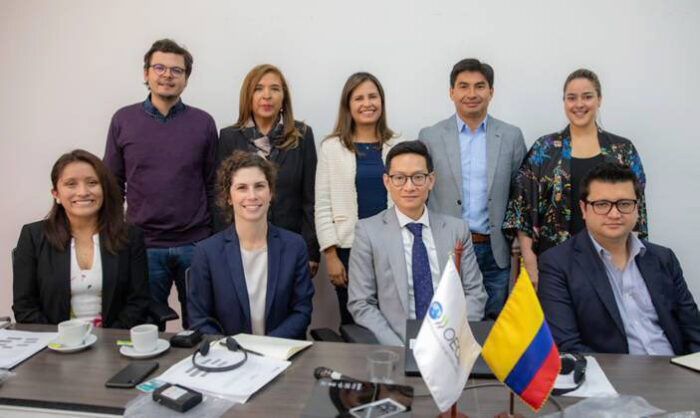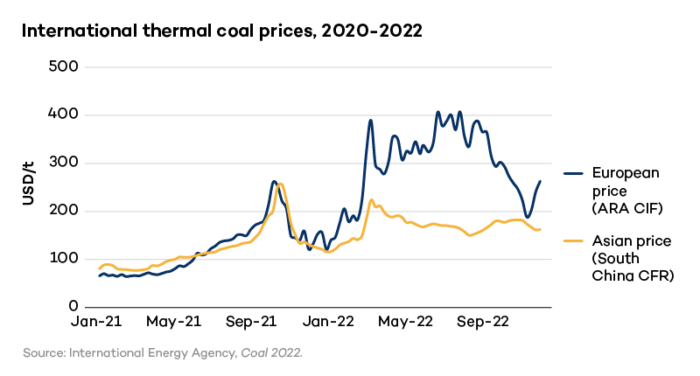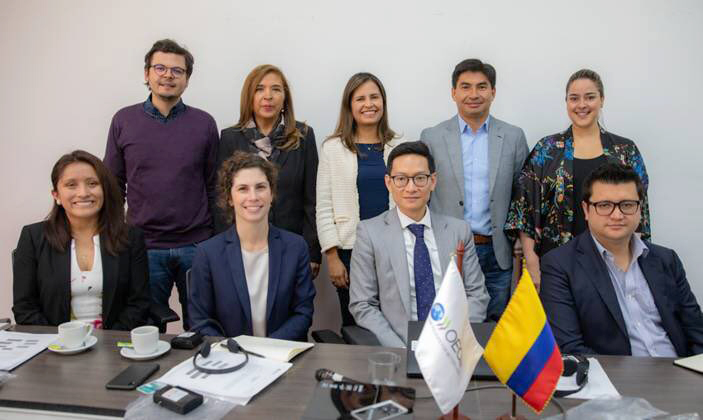
Representatives from the IGF, OECD, and Government of Colombia kicking off the deep-dive program in early 2020.
The Challenge
Colombia is rich in mineral resources, including coal, gold, nickel, and emeralds. The mining sector is a significant contributor to government revenues. After joining the Intergovernmental Forum on Mining, Minerals, Metals and Sustainable Development (IGF) in 2018, Colombian officials began participating in IGF-led workshops on financial benefits, where they learned about revenue risks related to international taxation in the mining sector and explored case studies illustrating how governments can address these risks.
By 2020, officials recognized that Colombia could benefit from technical assistance and capacity building to strengthen its fiscal policy and improve revenue collection in the mining sector. The government requested deep-dive support, a multi-year offering from the IGF’s Global Mining Tax Initiative, delivered in partnership with the Organization for Economic Cooperation and Development (OECD).
Our Role
Coal Pricing
As the national mining agency was considering updating its coal pricing methodology for royalty collection, the IGF and OECD hosted a capacity-building workshop in May 2021 for 120 officials from the national revenue authority, the ministry of finance, and the mining agency, covering the coal value chain and pricing for royalty and tax assessments.
Over several months following the workshop, the IGF provided technical assistance to the national mining agency. In tandem with the government, we dissected coal price benchmarks, examined price reporting agencies, and analyzed export data to fully understand the value of Colombia’s coal in the global market. We also provided advice to officials as they discussed coal pricing benchmarks with industry representatives.
In September 2021, the IGF submitted policy proposals and other suggestions to the national mining agency to improve oversight of royalty payments in the coal sector.
Tax Treaties
The IGF and OECD provided a 4-day workshop in July 2020 for 100 government officials from the national revenue authority, the ministry of finance, and the mining agency.
Later that year, the IGF offered advice and guidance to Colombia’s tax treaty negotiation team as it was updating Colombia’s model tax treaty, which serves as a reference in negotiations. The team was seeking to strengthen the model, to ensure that Colombia maintains the right to tax mining income arising at all stages along the value chain, including exploration.
In early 2021, the IGF delivered a report to the revenue authority with recommendations for selected articles in the Colombian model tax treaty.
Transfer Pricing Audits
The IGF and the OECD also supported a tax audits on companies in the mining sector and connected Colombia’s auditors with a transfer pricing expert from Tax Inspectors Without Borders (TIWB) from Chile to build their understanding of the importance of risk assessments in transfer pricing analysis.
Monitoring Mineral Exports
We delivered a training program designed to improve how Colombia monitors the volume and value of copper and gold exports. As part of the program, we helped officials from mining and revenue authorities identify weaknesses in the existing system and offered recommendations for improvement.
Our Impact
Coal Pricing
Our work coincided with the national mining agency’s review of its methodology for defining coal prices for royalty collection. Industry representatives were recommending the government use lower coal price benchmarks from Asian ports to value mineral royalties instead of the European benchmark that was used historically. IGF analysis revealed that Colombia’s coal (as of 2021) was still mainly exported to Europe and the Mediterranean region. It helped the authorities to decide against using lower benchmark prices.
That decision proved consequential. In 2022, Asian coal prices remained stable at around USD 169 per tonne while European prices increased significantly (see chart below), according to the International Energy Agency. In sticking with the European benchmark, Colombia used an average price of USD 290 per tonne to calculate coal royalties that year. That USD 121 price difference, multiplied by the 64.7 million tonnes of coal Colombia exported in 2022, contributed USD 7.83 billion to the royalty base, which was subject to a 10% royalty—generating USD 783 million in revenue for Colombia.

“The support received from the IGF and OECD in relation to coal valuation in the international market, taxing coal mining and processing, and the updated methodology for calculating royalties has been useful,” said Helder Bejarano, Advisor to the National Mining Agency of Colombia.
“Specifically, the technical and market structures, including supply and demand; the main international indices for coal and shipping; the procedures for the design, construction, and publication of the indices that best apply to Colombia’s thermal coal export market; the realities of this market over the last 5 years and its impact on price formation for royalty payments; the risks facing governments on tax and royalty payments; and above all, understanding how companies try to shape the design and implementation of mining policy,” Bejarano said.
Tax Treaties
Based on our workshop, technical assistance, and recommendations, the international tax team at Colombia’s revenue authority adopted stronger provisions for Article 5 of their model tax treaties. Article 5 is important because it outlines the terms under which mining-related activities give rise to a taxable presence known as a permanent establishment. The strengthened model tax treaty has been used in several negotiations to help Colombia protect its right to tax income from extractives, with one successful case as of September 2024
“The interaction between the different treaty and mining experts was great, and [learning about] the experience of other countries [during the training] was very enriching,” said Claudia Vargas, Advisor to the Commissioner General, Directorate of National Taxes and Customs (DIAN), Colombia.
“Within the international tax group, we oversee negotiating double taxation treaties and dispute resolution under the mutual agreement procedure, and we will be signing advance pricing agreements. So, the training gave me many tools and ideas to keep in mind about international taxation and treaties … to see how the agreements and rules apply to the extractive industry, and how we should negotiate with a view to the future of this industry,” Vargas said.
Transfer Pricing Audits
Our work has contributed to ongoing transfer pricing audits of mining companies in Colombia. Moreover, following the risk assessment work supported by TIWB, the revenue authority has begun developing a transfer pricing risk analysis tool.
Monitoring Mineral Exports
Following our training and advice, government officials reported increased knowledge about the key issues related to monitoring mineral exports. Additionally, our work helped facilitate important dialogue and experience sharing between the revenue authority, the national mining agency, and the mines and energy ministry.


